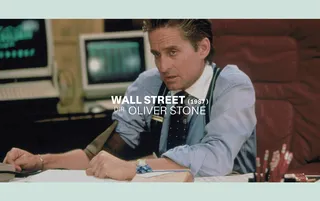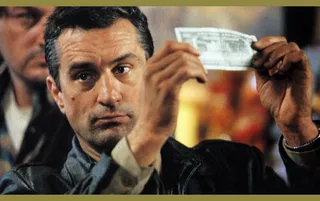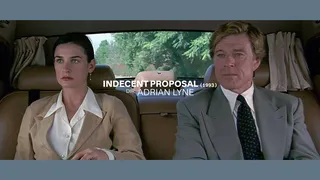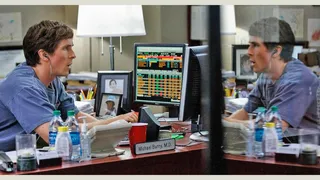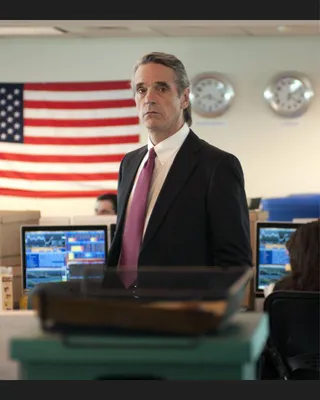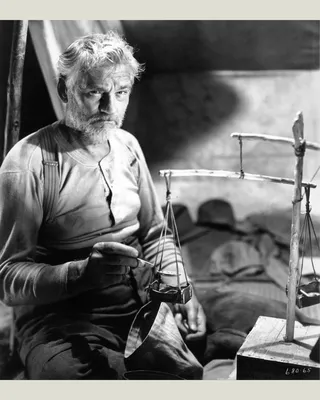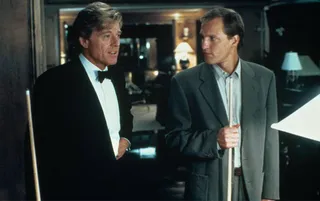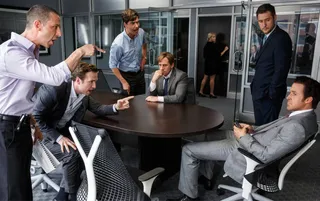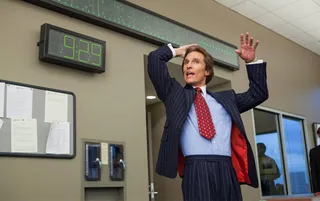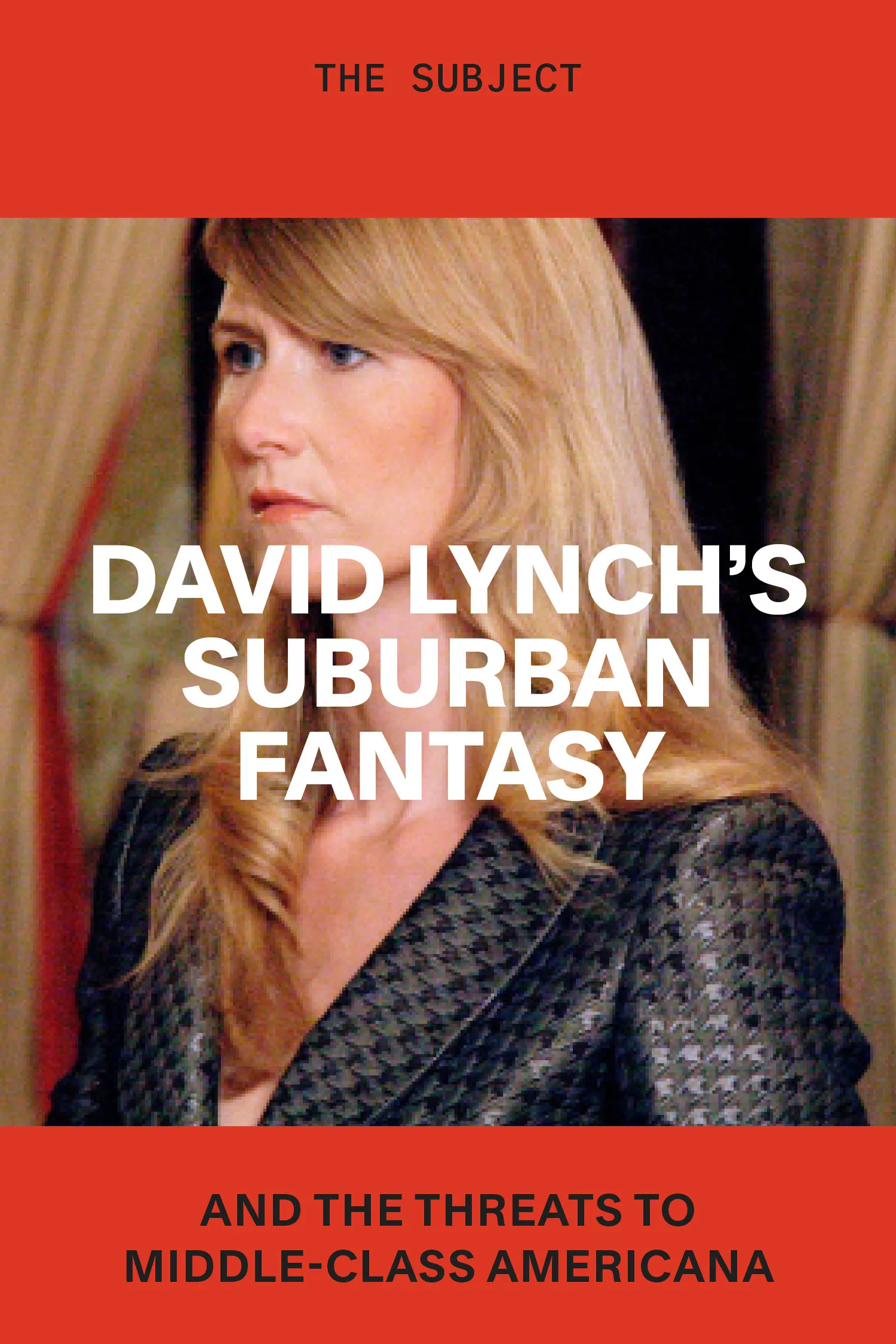Money Shot
By Laurie Stone

The Wolf of Wall Street, dir. Martin Scorsese, 2013
Money Shot
Laurie Stone
Greed, lust, murder, power: inside the manosphere of finance films
April 4, 2025
![]()
![]()
Midnight Run, dir. Martin Brest, 1988
Is money male? You might think so from the array of money-themed films I just watched, with casts that are just about all men. Except for Indecent Proposal (1993). There’s a woman in that movie, played by Demi Moore, a woman exchanged for cash when a billionaire pays her husband for one night of sex.
Is money a penis? When you ask money what it is, money says yes, it is a penis and anything else you want it to be. Money is desire before it’s traded for something and attached to meaning. It floats. It has wings. In ancient social systems, money ushers freedom from schlepping. Once you have a symbolic means of exchange for goods and services, if you want to buy something, you don’t have to haul your pig or your giant pot to the market to pay for it.
It’s a ton easier for men to get financing for their ideas than for women to finance theirs. When men make movies or do anything else, their thoughts drift to the thing they know and love the best: the subject of men. And especially tender to men is the drama of men without women. Is money Moby Dick? Money is always a MacGuffin, but all MacGuffins are not money.
Two movies in the bunch are knockouts: John Huston’s The Treasure of the Sierra Madre (1948) and Adam McKay’s The Big Short (2015). Both are morality tales. All movies about money are morality tales. Morality tales plus father-and-son mishegas. It’s easy to see why movies about money are both morality tales and stories of father-and-son mishegas when you have a landscape solely of men and where money represents what a man is. A man is a person with the largest pile of stuff.

Azor, dir. Andreas Fontana, 2021
Stanley Kubrick would say yes, sure, a man is defined by how much stuff he’s piled up, and Kubrick would also propose, as he does in 2001: A Space Odyssey (1968), that the way a man gets to pile stuff up is by being murderous at the core. In 2001, humankind (and by humankind Kubrick means men) is born—courtesy of the alien-planted monolith—when a big, aggressive ape joyfully tosses a femur bone into the air, a bone he’s just used as a murder weapon. In the most time-efficient jump cut in film history, the bone becomes a spaceship—an advance in the technology of weaponry and domination, you could say, but not different in kind from the tool of the bone. In Kubrick’s version of men, they aren’t always fighting to gain more stuff. They are fighting purely for the joy of killing each other.
Which brings us to the mishegas in so many films about money, in which sons kill their fathers, and fathers their sons. Compared to the pure joy of killing, money may feel like a pale-substitute form of domination. Does money always represent domination? Pretty much all the time, yes, in these films. And everywhere else. I’m talking to you, tech billionaires funding murderous father-bully oligarchs, and I’m talking to you, unfuckable tech-billionaire incels, functioning as oligarchs yourselves.
The other night, I rewatched The Treasure of the Sierra Madre, directed by John Huston from a screenplay he adapted from the novel by B. Traven. You got everything going in this movie: money as domination, a morality tale about the biggest pile of stuff, and father-and-son mishegas. The thing that stands out isn’t the performance by Bogie, who gets top billing, but Walter Huston as Howard, a veteran gold prospector, a performance by the director’s father so focused and tender and loving toward his son it lofts the movie skyward with a kiss.
“IS MONEY A PENIS?”
Dobbs (Humphrey Bogart) and Curtin (Tim Holt), two American drifters, set off with Howard into the Mexican mountains to strike it rich. They hope to set their lives on a course they dream of, although their dreams are vague. Curtin thinks maybe he wants to grow fruit. Dobbs stares into the distance while the other men imagine—as we do—that he’s thinking about a woman he’s missed for months on the clean sheets of a bed in some hotel room. They dart from these thoughts quickly, preferring vague dreaming to anything concrete. That vague sense of dreaming is another thing money is.
Bogie plays a man ambushed by paranoia that can form during a hunt. We can’t care about Bogie because he’s sour. You can almost hear a voice grinding away in Bogie’s head, asking him what he’s willing to do for money. I mean, as in acting this part. Does he love it? After all, he has to see his gold dust scattered in the wind and end up dead. In different castings, Bogie so joyously loves playing Sam Spade in 1941’s The Maltese Falcon (another movie about the murders people will commit for a fortune) and in Casablanca (1942). In these films, he leads with his sexiness, not with his grumpiness. Bogie is no one’s idea of a handsome leading man, but in sexy mode he can make even the heart of a fake bird statue beat faster.
Howard is their guide because he’s already lived the emotions stirred by wanting. Wanting makes you kind of nuts, he warns, and depending on your temperament, it can egg you on to steal or kill. Wanting, the film shows, is always mysterious. It has a life of its own, detached from even fantasies of satisfaction and enough.
Wanting is a thing so mysterious it’s the reason morality was invented, in order to control it, although it can’t be controlled, we see over and over. Tales of money set up wagers, tests of how far you will go, the stuff of fables and fairy tales. You may have three wishes. You must overcome three ordeals. Wanting may be the most dangerous thing we are, but it is also the most pleasurable thing we are: bodies that want things.
From left: Indecent Proposal, dir. Adrian Lyne, 1993; The Big Short, dir. Adam McKay, 2015
Is money sex? Is the Pope Catholic? In Adrian Lyne’s Indecent Proposal, Robert Redford offers Woody Harrelson a million dollars to sleep with his wife, Demi Moore. Demi looks sexy in the film and doesn’t get to act. No one does. The three characters stand for a man who uses money to buy sex, a man used by a man who uses money to buy sex, and a woman—nobody cares what she wants.
Demi and Woody are supposed to be in love. Their sexual chemistry is zero because Woody has no sexual chemistry. Sorry, Woody. The couple needs money. Never mind why. The movie was filmed in 1992, when Redford was 56 and Demi was 29, and Redford is shot through Vaseline a lot. His hair is great, and otherwise he’s Redford, and who would you rather sleep with: Redford or Woody? I mean, really, for a million dollars or five dollars.
Woody tortures himself thinking Demi wanted to sleep with Redford all along and used the money as an excuse. If only. No, she’s been cut to fit her gender assignment: She’s good at sacrificing herself. That’s her value in the film’s economy. It’s what makes her fuckable to both men.
Midnight Run (1988), directed by Martin Brest, is a far more entertaining film featuring a character with a price tag. Robert De Niro plays Jack, a former cop now working as a bounty hunter. Charles Grodin plays Jonathan, a mob accountant on the run for stealing $15 million—that he’s given to the poor. Since we know from the first moments that De Niro’s angry hunter won’t deliver Grodin’s foxy schmendrick to his death, we understand the movie’s test is whether a person will forfeit money instead of claiming it.
Jack nabs Jonathan in New York and must return him to Los Angeles for the reward. After Jonathan pretends he’s afraid of flying, the movie becomes the Odyssey without the pressure of returning to any Penelopes. The men need only each other, and in this odd-couple marriage, the movie writes an apology to the wrong assumptions we make about strangers.
The film runs two hours and isn’t long enough because it’s so much fun watching the men discover each other while eluding capture by another bounty hunter, federal agents, mob hit men and local police. The suspense is in the way intimacy will grow. Between flights and escapes, the men talk and shyly admit secret longings. They’re surprised by the way intimacy makes them feel—that is, a little safer in a world where all around them things are unsafe. That’s how you know it’s a love story. Maybe in all love stories something is more tempting than money to the human heart.
![]()
Margin Call, dir. J.C. Chandor, 2011
![]()
The Treasure of the Sierra Madre, dir. John Huston, 1948
Not so much in Wall Street (1987), directed by Oliver Stone, and The Wolf of Wall Street (2013), directed by Martin Scorsese, two boilerplate father-son headbutts in which a younger striver meets up with an older snake who can make him rich. Most of the movies men make about money twirl around some intergenerational murder trope—including The Treasure of the Sierra Madre and Indecent Proposal. You have to think, Jesus, really? More of this?
You have to think of Jesus himself, and Abraham and God, and you have to think for fuck’s sake, enough with these men and their sons and their fathers, dominating our thoughts and lathering themselves up, as if their angst about each other’s power is important or dramatic or interesting because men badger us with it. And sell it to us in their films.
Azor (2021), directed by Andreas Fontana, is a far creepier film than movies with explicit gore or scenes of mass firings, which are standard in Wall Street pics. The movie is a tract, not a narrative, in that the characters are allegorical figures, illustrating lessons the movie wants to teach. In style, it’s compellingly fragmented. The viewer has to piece together what the main character, a Swiss private banker, is also learning through one lie and misdirection after another. He’s in Argentina, visiting clients in 1980, during the period of the right-wing military junta that’s disappearing dissidents.
Does the banker care? He pretends to sometimes with half-smiles that slide off his face, sluglike. His crowning achievement? Signing up the junta to his client list, side by side with the rich people the junta is stealing from. Greed, we’re shown, separates people from any social ideology, and we’re back to Kubrick’s murderous apes.
The Big Short, with a screenplay by director Adam McKay and Charles Randolph, is another great movie about money. It’s based on Michael Lewis’s chronicle of the 2008 financial crisis, a loss of trillions of dollars tripped by the sale of worthless mortgages in the U.S. When hoodwinked homeowners defaulted on their payments, those losses popped the housing bubble and all kinds of other speculation in banking. Christian Bale plays lead finance nerd Michael Burry, who predicted the banking crisis two years before anyone else.
The movie is a great movie-movie in the way it sucks you right into its sporty tone. Celebrities like Anthony Bourdain and Margot Robbie deliver set-piece lectures on financial instruments and high-stakes trading. Before you know it, you’re rooting for the clever social losers—the cast includes Steve Carell, Ryan Gosling, Brad Pitt and Jeremy Strong—in their bad hairpieces and outdated clothes, guys who come to believe in Burry’s prediction that the housing market will crash and who set up a system to short what is basically the world economy.
“Greed separates people from any social ideology.”
Has ever a film danced so gracefully and with so much humor on top of a misfortune that cost millions of people their homes and jobs? In the film, we hardly see the poor schnooks who go down, having trusted liars and cheats. We’re focused on the players, all of them outliers in some way, who have bet against the liars and cheats, and when they win, they don’t know how to feel about the money they have collected in the trade. Like them, we, too, don’t know how to situate ourselves in the emotional ride we’ve taken. The men who cash out are still doing it on the hides of the poor, and on our hides. The biggest liars and cheats didn’t pay. They got bailed out by the U.S. Treasury.
In the old financial model described by Adam Smith, the economic system rights itself because the speculators are allowed to fail. Government bailouts create another system, where the one percent, no matter how much they lie and cheat, don’t lose. In The Big Short, we’re shown that the system of dirty dealing is not only at the level of the bankers. It’s also part of a dirtier and larger system of government regulators and legislators who decide to leave money in the hands of the politically and economically powerful.
Margin Call (2011), written and directed by J. C. Chandor, takes us inside a private investment firm that accidentally becomes the canary in the 2008 banking collapse. Will the firm’s owner, played by Jeremy Irons, do the right thing and accept his losses, or will he sell the firm’s holdings knowing others will go down soon after? One guess. Irons plays the part with so much oily charisma he makes even slimy Kevin Spacey, one of his executives made to bend, look freshly bathed. It’s quite a tingling film, as each man has to decide what he’s willing to do for the bonus check promised for off-loading junk to trusting traders.
From left: Robert Redford and Woody Harrelson in Indecent Proposal; Leonardo DiCaprio in The Wolf of Wall Street; Jeremy Strong, Rafe Spall, Hamish Linklater, Steve Carell, Jeffry Griffin and Ryan Gosling in The Big Short; Matthew McConaughey in The Wolf of Wall Street
The movie, which received an Academy Award nomination for best original screenplay, is chock full of character-defining monologues from the Paddy Chayefsky morality-play handbook. They are weirdly stirring, sometimes because the values expressed in them—the ones wrecking our society now—are so unapologetically naked.
In one scene, Spacey tells Irons he’s out, believing he’s discovered a system of speculation more rigged than he’d believed. Seducing him back, Irons says, in his silky baritone, “You’ve been doing that every day for almost 40 years.… It’s just money. It’s made up. Pieces of paper with pictures on it so that we don’t have to kill each other just to get something to eat.… Whatever you want to call this, it’s all just the same thing over and over. We can’t help ourselves. And you and I can’t control it or stop it or even slow it or even ever so slightly alter it. We just react, and we make a lot of money if we get it right, and we get left by the side of the road if we get it wrong. And there have always been and there always will be the same percentage of winners and losers, happy fucks and sad sacks, fat cats and starving dogs in this world. Yeah. There may be more of us today than there’s ever been, but the percentages, they stay exactly the same.”
What do men want? What does Bogie’s character Dobbs want with the gold dust he’s collected, gold that, spilled out by accident, gets returned in windy gusts to the mountain where it came from? Dobbs doesn’t get farther in his imagination than fearing that other men will rob him.
What do tech billionaires want? What do the oligarchs want that tech billionaires fund? What do the information brokers want who sell weapons and secret intel to the highest bidders, independent of their political ideologies? What do supercomputers want as, in nanoseconds, they trade on minute discrepancies in currencies and clock billions for private investment firms? What do the billionaires want who live in compounds protected by private armies? What do terrorists want? To feel less bullied and less humiliated? Everyone wants to feel less bullied and less humiliated. Why, in movies about money, is the word democracy almost never said? How are movies about money a mirror of our time? Because in them nothing is solved and no systems are disbanded, although they are all broken. Every movie about money leaves you feeling empty.
